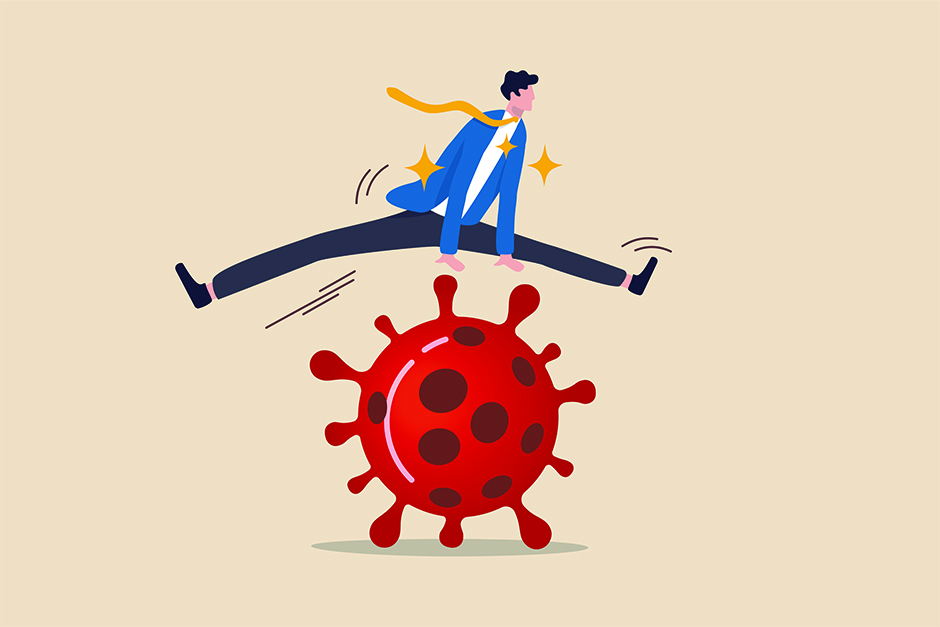No ivory tower here. When the coronavirus pandemic kicked in, the College of Arts and Sciences rose to the challenge with logistical creativity and illuminating learning experiences.
Clearly, the Department of Microbiology and Immunology, a rigorous Miller School of Medicine program that grants bachelor’s degrees through the College, is having a moment. Professor Diana Lopez, who has taught, conducted research, and mentored students in the field for more than half a century, notices that people are “paying a lot more attention” to her specialty than ever before.
The pandemic drove department courses such as Roger Williams’s Introduction to Microbes and the Immune Systems to new levels of urgency. “COVID reinforced the importance of handwashing and other disinfectant protocols that we were already instilling,” says Williams. “You always want to respect the microbes. They’re not all bad, but you want to protect yourself, even during ‘normal’ times.”
Percolating through every aspect of life, the challenges posed by the pandemic are addressed in coursework across the College.
“If I hadn’t talked about what was going on with COVID-19 in my criminal justice courses, it wouldn’t have been fair to students,” says Alex Piquero, chair of sociology and criminology. “The pandemic affects everyone every day. Police still had to do their jobs, which are more dangerous than ever. Meanwhile, courts on every level canceled or postponed proceedings.
“I wanted students to think about how the real world was operating in ways it wasn’t equipped for.”
For an extra-credit assignment at the end of the fall 2020 semester, though pandemic metrics were a politically fraught moving target, Piquero assigned a one-page overview of the virus situation in jails and prisons. What the results lacked in length, they had to make up in relevant data and impact.
“I’ve done tons of testifying to government bodies, and I can tell you that if a paper clip or staple is involved, nobody will read it,” Piquero says. “You have to get your point across very quickly. I think students enjoyed the exercise because I did not give them a lane to stay in. Rather, it was: ‘You tell me what matters.’”
Highlighting the Human Element
As we now know all too well, when it comes to a global pandemic, it’s not all about science and data. Human emotions and cultural beliefs play vital roles in our responses to such a crisis.
In her course on medieval pandemics and other diseases, Susanna Allés-Torrent, an associate professor in the Department of Modern Languages and Literatures, assigns writings ranging from the Bible to Giovanni Boccaccio’s 14th-century novella collection Decameron. The readings put the current moment into vivid historical context while revealing how little some things have changed.
“Many people in the past thought that epidemics occurred because someone did something wrong,” Allés-Torrent says. “They needed someone to blame or thought it was a punishment of God. Then and now, human nature is always the same. But it can be comforting to connect with the past—to see that people from centuries ago got through it and that society even evolved in some positive ways as a result.”
Though the classic symbol of theater features the masks of comedy and tragedy, COVID mask mandates posed significant challenges for the Department of Theatre Arts. As senior lecturer David Williams points out, masking up takes away a large portion of one’s acting ability, while remote online settings dilute the intimacy that makes theater such a vibrant art form. Yet the U’s theater arts community embraced the challenge, creating virtual footlights experiences ranging from the musical Hello Again to a lighthearted Fight Club student video overseen by assistant professor Burton Tedesco.
“I’m proud of everyone’s incredible creativity, flexibility, and ingenuity on all fronts,” says Theatre Arts chair Jennifer Burke. “We’ve developed techniques we didn’t have a year ago, and we’re confident that we can adapt to whatever the new academic year requires. Theater people have an advantage in our training,” notes Williams. “The secret of acting is reacting. That’s what we did all year and will have to keep doing”—words that resonate for not only the art of theater but every aspect of living and learning amid these challenging times.

